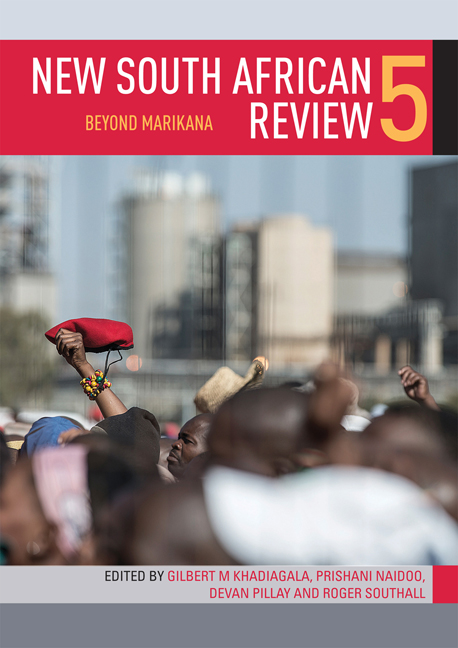Book contents
- Frontmatter
- Contents
- Preface
- Introduction: Political reconfigurations in the wake of Marikana
- PART 1 NEW POLITICAL DIRECTIONS?
- PART 2 ECONOMY, ECOLOGY AND LABOUR
- PART 3 STATE AND SOCIETY
- Introduction to Part 3
- Chapter 8 Constitutionalism: An ‘unqualified human good’?
- Chapter 9 People's Parliament? Do citizens influence South Africa's legislatures?
- Chapter 10 Corruption
- Chapter 11 Marikana and the politics of public order policing
- Chapter 12 ‘In December we are rich, in January we are poor’: Consumption, saving, stealing and insecurity in the kasi
- PART 4 SOUTH AFRICA IN THE INTERNATIONAL ARENA
- Contributors
- Index
Chapter 12 - ‘In December we are rich, in January we are poor’: Consumption, saving, stealing and insecurity in the kasi
from PART 3 - STATE AND SOCIETY
Published online by Cambridge University Press: 21 April 2018
- Frontmatter
- Contents
- Preface
- Introduction: Political reconfigurations in the wake of Marikana
- PART 1 NEW POLITICAL DIRECTIONS?
- PART 2 ECONOMY, ECOLOGY AND LABOUR
- PART 3 STATE AND SOCIETY
- Introduction to Part 3
- Chapter 8 Constitutionalism: An ‘unqualified human good’?
- Chapter 9 People's Parliament? Do citizens influence South Africa's legislatures?
- Chapter 10 Corruption
- Chapter 11 Marikana and the politics of public order policing
- Chapter 12 ‘In December we are rich, in January we are poor’: Consumption, saving, stealing and insecurity in the kasi
- PART 4 SOUTH AFRICA IN THE INTERNATIONAL ARENA
- Contributors
- Index
Summary
KNOWING THE KASI
All residential areas in South Africa are legally townships. However, for many years townships were segregated into the four racial categories of apartheid: African, coloured, Indian and white. Black townships – those of Africans, coloureds and Indians – retained the appellation of township, or location, or kasi. Whites lived in ‘town’ and in larger urban areas in the suburbs. Townships, particularly those designated for Africans, were often little more than houses and hostels with minimal facilities. But their inhabitants made these spaces their own – the kasi has its own culture, rhythm and rules. They remain different, twenty years after the end of apartheid.
In this chapter I engage with a series of interconnected issues around consumption, saving, stealing and the resulting insecurity and limited trust that characterise South African townships. Such a view contradicts the stock image of townships as places of solidarity and collective living. This picture of collective life is not without foundation: collective worship in a multitude of churches; the ubiquitous saving societies or stokvels; football leagues and neighbourhood participation in funerals, mesebetsi (ceremonies) and weddings. The level of community involvement in these activities, and the established norms with which they are practised and produced, is impressive, but it is not the only side of kasi life. The same people who sing harmoniously together in the church choir, or help at a neighbour's funeral, are also engaging in other more individual, more competitive, often secret, and frequently desperate activities. These activities are less visible, but no less important, than manifestations of a collective life.
I explore this side of kasi life through drawing on personal interactions within Gauteng and Free State townships. To talk about ‘the township’ is, of course, a generalisation. I speak here from my experience in a small number of African (rather than coloured or Indian) townships, in two of South Africa's nine provinces. Townships are also internally differentiated. The national census (Statistics South Africa 2012a) identifies four housing types that make up townships. A ‘formal dwelling’ is a structure built according to approved plans: a house on a separate stand, a flat or apartment, a townhouse, a room in a backyard, or rooms or flatlet elsewhere. A ‘hostel’ is a collective form of accommodation for workers or students (but not including boarding school hostels).
- Type
- Chapter
- Information
- New South African Review 5Beyond Marikana, pp. 229 - 244Publisher: Wits University PressPrint publication year: 2015



